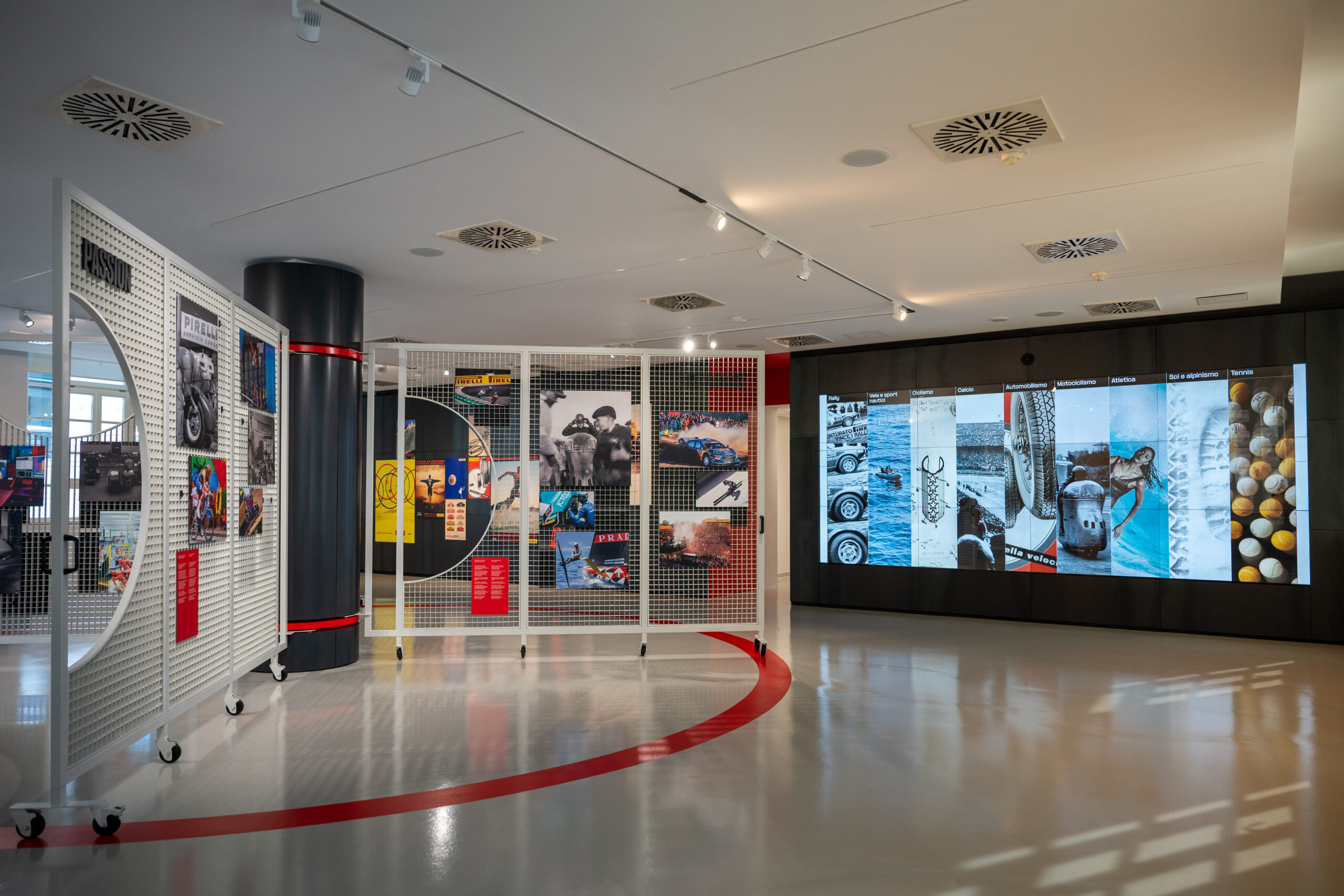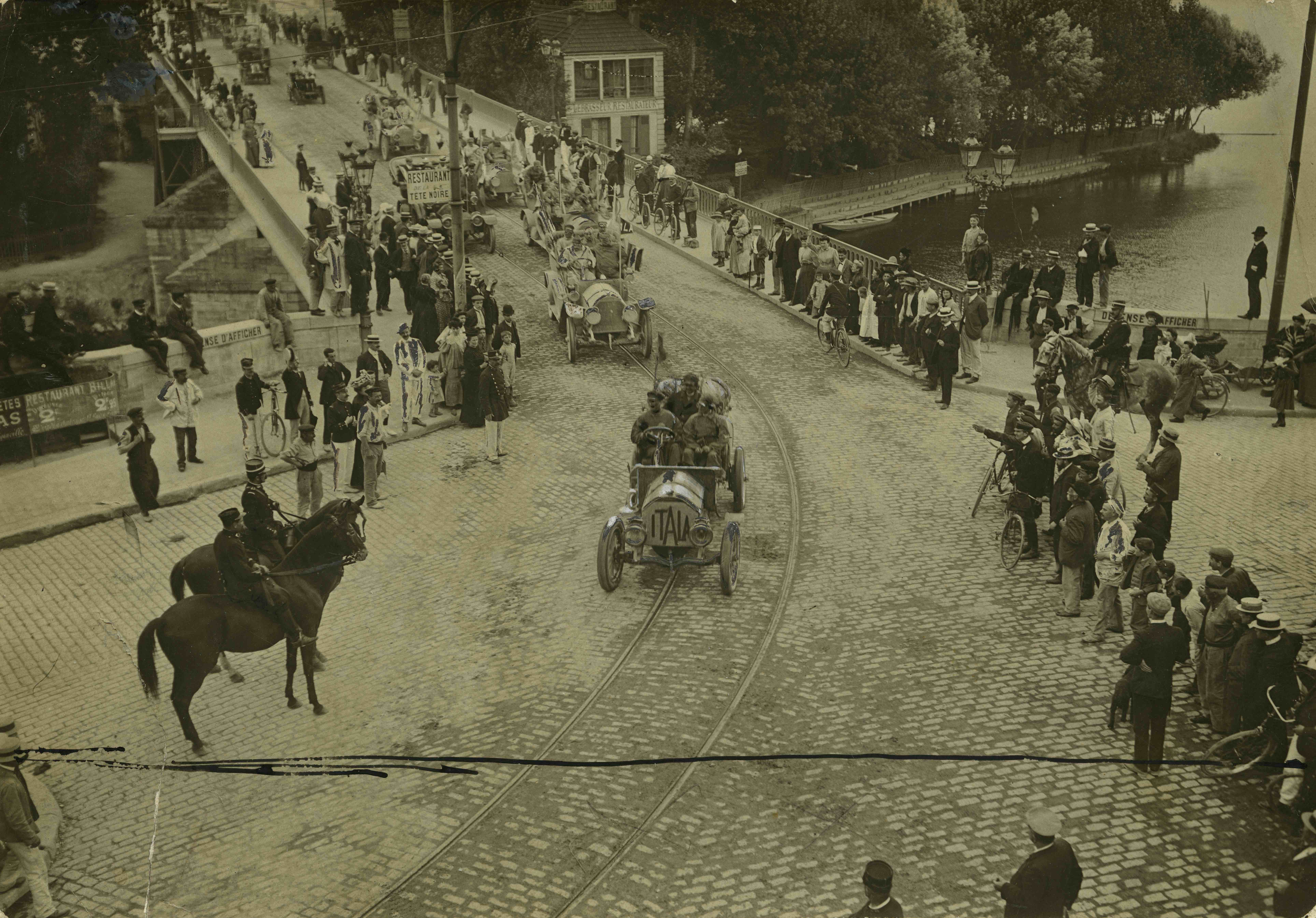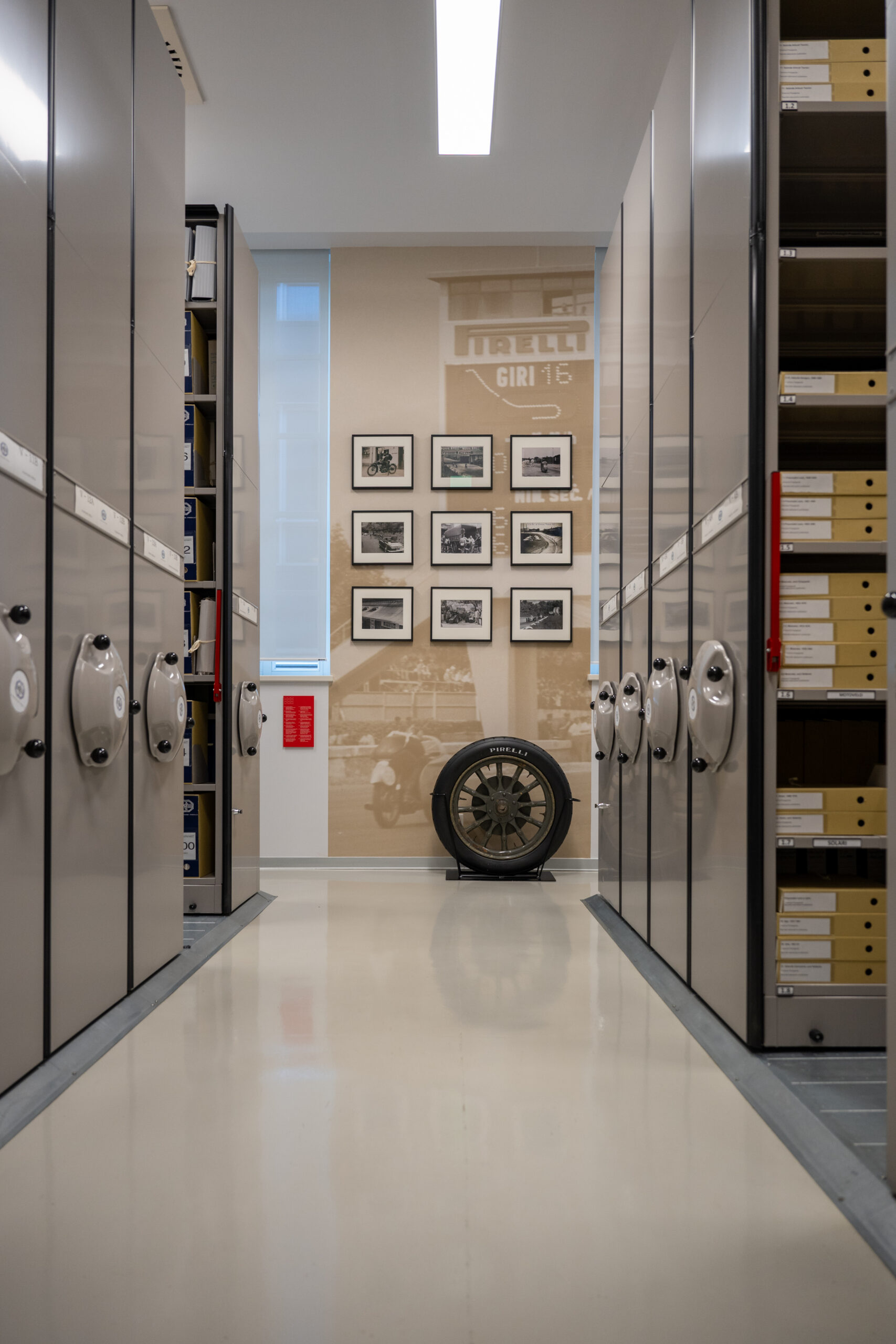Interview
The Pirelli Foundation: Weaving History into the Future
Alberto Pirelli shares the origins of the Pirelli Foundation and the vision that continues to shape its mission today. The Foundation not only preserves the company’s rich heritage but also actively transforms it into a source of inspiration for innovation. Through its work, it connects different generations, fosters dialogue, and builds bridges between the past and the future – benefiting Pirelli’s stakeholders as well as the wider community.
Interview with Alberto Pirelli

At their core, corporate archives are designed to collect, store, and protect information. The most forward-thinking archives, however, aim to do much more – they strive to share stories, inspire innovation, and connect generations. At Pirelli, one of the world’s most iconic family-founded companies, this vision comes to life through the work of the Pirelli Foundation.
For over 150 years, the Pirelli name has been deeply intertwined with the people and culture of its region. Today, the Pirelli Foundation places education and accessibility at the heart of its mission, recognising that the company’s history is not only a corporate record but also a shared legacy.
Alberto Pirelli, Member of the Board of Directors of the Foundation, sees it as both a privilege and a responsibility to use the archive’s rich resources to benefit the company’s many stakeholders and overall community. He believes Pirelli’s historical collection is more than a clear and compelling record of the company’s dedication to its product quality, innovation, and heritage – it’s a testament to the fundamental values of the Group’s corporate culture.
Q: What key events led Pirelli to establish the Foundation?
Pirelli really begins in 1823 with the birth of Giovanni Battista in the village of Varenna. His father was a baker, and his mother cared for their ten children – together, they managed to save enough money to send Giovanni to study in Milan, at what would later become the Politecnico University of Milan. Giovanni earned a scholarship and travelled around Europe, studying and analysing the strengths of different industries. After concluding the fledgling rubber industry had excellent future potential, he founded the Pirelli company in 1872.
From the outset, research and development, technology, and customer-centricity were central to the company’s philosophy – values that are still upheld today. More than 150 years later, Pirelli is one of Italy’s oldest and most respected multinational corporations, known for its vibrant corporate culture that combines scientific research, artistic experimentation, talent cultivation, and a focus on industrial humanism.
In 2008, the Pirelli Board of Directors established the Pirelli Foundation, located in Milan’s Bicocca district, where the Group’s headquarters are based. The Foundation was created to safeguard and share the company’s cultural and historical heritage. It serves not only as a repository of Pirelli’s corporate memory but also as a resource for the broader community, highlighting the deep connection between the company, the region, and the people who have shaped its remarkable journey.

Pirelli Foundation, Open Space. Photo: Ippi Studio, 2024.
Source: Fondazione Pirelli
Q: How has the Foundation evolved and stayed relevant in today’s continually changing world?
When the Pirelli Foundation was first established in 2008, documentation was gathered from the archives of 24 industrial facilities and a much larger number of global commercial companies to present and reflect Pirelli’s long and international history. Since then, the Foundation has evolved into multiple archives, promoting the relationship between the Pirelli Group, its Italian roots, and the broader international community. At its core is a commitment to building a future informed by the efforts of the past.
Today, the Pirelli Foundation’s focus is multifaceted but primarily preserves documentation from Pirelli’s founding in 1872 to the present day.
Its historical archive contains four kilometres of documents, ranging from governance, industrial, and technical material to communication and cultural records, offering a window into the company’s past transformations.
However, the Pirelli Foundation is not just about storing history – it’s about sharing it. Every year, the Foundation welcomes thousands of visitors through exhibitions, conferences, publishing projects, corporate libraries, guided tours, and research initiatives. Increasingly, the Pirelli Foundation is positioning itself as a resource that informs, educates, and encourages dialogue, in the belief that its culture is an important asset that should be preserved and shared.
Q: What are the oldest documents saved in the archive?
Some of the oldest stretch back to the company’s very beginning. The archive holds the designs of Pirelli’s first factory, a 1,000-square-metre facility built in 1873 and located in Santa Milano. At the time of its construction, my grandfather would visit the countryside where it was being built on horseback with two or three others, all carrying firearms because there was a legitimate threat posed by wolves. Incredibly, that area is now the heart of Milan.

The Peking-Paris motor race: the Itala car arrives in Paris, 1907.
Source: Fondazione Pirelli
Q: Who directs the activities of the Foundation’s archive, and what distinguishes it from other corporate archives?
The Pirelli Foundation is governed by a board of directors, including representatives from both the Pirelli Group and the Pirelli family. The board is chaired by Marco Tronchetti Provera (Pirelli Group’s Executive Vice President) with Cecilia Pirelli as Honorary Chairman. The board also includes myself (Alberto Pirelli) as an adviser together with Antonio Calabrò (Pirelli Group’s Senior Vice President Culture), Nicolò Pirelli and Giovanni Tronchetti Provera (Pirelli Group’s Executive Vice President Sustainability, New Mobility and Motorsport). The archive itself is overseen by managers of the Pirelli Group’s Corporate Culture Department, Antonio Calabrò as Managing Director and Laura Riboldi as Deputy Director. The Foundation includes a team of specialists responsible for cataloging and preserving the archive materials, for the research and the access to the collections, for promoting digital and communication initiatives and all the other corporate culture activities.
Its strong commitment to the community distinguishes the Pirelli Archive from other corporate archives. In recognition of its historical importance, the Italian Ministry of Culture had previously declared the Archive of “significant historical interest” and placed it under official protection in 1972, which was a great honour.
Structurally, the archive consists of various collections that undergo constant reconditioning, restoration, cataloguing, and digitisation. A key feature is the communication section, which conveys the long-standing collaboration between Pirelli and intellectuals, artists, photographers, and enthusiasts from the world of graphics. The photographic collection alone includes thousands of images capturing everything from factories, products, and trade fairs to motorsports events and fashion shoots, many of them commissioned by the Advertising and Communication Department from the 1910s to the 1990s for company magazines, product catalogues, and advertising campaigns.
The Pirelli Foundation also houses a scientific and technical library with over 16,000 volumes, as well as an institutional library with approximately 2,000 books. Among its most valuable collections are the personal documents of Leopoldo Pirelli, which chronicle his tenure as Group Chairman from 1965 onward, providing insight into key events in the company’s modern history.

Pirelli Foundation, Historical Archive. Photo: Ippi Studio, 2024.
Source: Fondazione Pirelli
Q: What role does Pirelli Foundation play in inspiring younger generations about the values of entrepreneurship, innovation, and family leadership?
A recent study in the Milan district revealed that while startups in the region had innovative concepts, as well as the inspiration to develop them, an absence of entrepreneurial perspective and culture was keeping them from achieving their full potential. This is where the Pirelli Foundation sees an opportunity to make a lasting impact, aspiring to help young entrepreneurs realise their vision.
Since 2013, the Pirelli Foundation has offered free educational programs and courses designed to communicate the fundamental values of Pirelli’s corporate culture, particularly innovation, sustainability, and the spirit of entrepreneurship.
These initiatives are tailored for a wide range of learners, from elementary school students to university-level scholars and teachers.
At elementary school level, participants are encouraged to participate in creative projects often connected to the understanding of rubber and its uses. At secondary school level, students are involved in digital communication, robotics, automation, and more. High school and university students learn about technology, research and development, design, advertising, and sustainability.
Each year, over 3,500 students engage with these programs and courses. Since 2020, most activities have been made available online in the form of virtual tours, podcasts, and videos. The Pirelli Foundation has also formed joint ventures with top universities in Italy and abroad to create workshops and courses for undergraduates.
Q: What advice would you give to a family-owned business considering the creation of a corporate archive?
A corporate archive is a living repository that should not only safeguard the past but also actively contribute to a company’s ongoing success and legacy. As AI becomes more and more prevalent and powerful, it becomes critically important to record and preserve the accomplishments that form the true ethos of a company and the people responsible for it. Family companies very often exhibit conspicuous cultural DNA, which needs to be preserved and used as a touchstone that informs the future.
A company is a complex system. When workers embrace its culture, its purpose, and its vision, those workers and their contributions become the fabric of the company’s past, present, and future. Companies have more than just a role to play in their communities; we believe they have an obligation to build and share a cultural identity with all stakeholders. A corporate archive is a fundamental tool for achieving these goals.
Publication Date: 31-October-2025
The Interviewee
Alberto Pirelli, Member of the Board Directors, The Pirelli Foundation
Alberto Maria Tomaso Pirelli is a senior Italian business leader with wide experience in corporate governance and strategic consulting. Next to his role as Member of the Board of Directors at the Pirelli Foundation he is President of Fondazione Sodalitas and President of the Board of Directors of YesMilano. Alberto Pirelli is also the Sole Director of his investment company Finanziaria Alberto Pirelli and a board member of TP Industrial Holding. Formerly, he served as Vice Chairman of Pirelli S.p.A. Through these leadership roles, he has combined industrial expertise with financial advisory, reinforcing Milan and Italy’s competitiveness on the global stage.
